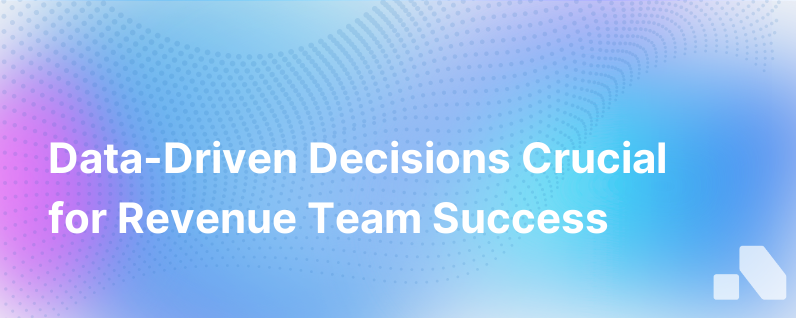Why Revenue Teams Cant Afford To Rely On Gut Feelings
Published on October 24, 2023 by David Zhang
In today’s data-driven business environment, the notion of relying on instincts, or “gut feelings,” seems almost archaic—belonging to a bygone era of door-to-door salesmen and rolodex networking. Yet, many revenue teams continue operating on hunches and intuition. While experience and instincts are invaluable assets, they cannot be the sole or primary drivers of decision-making for one simple reason: the business landscape is too complex and data too plentiful to ignore.
For revenue teams operating without a solid bedrock of data and analytics, the message is clear: you can no longer afford to rely on gut feelings. Doing so can lead to missed opportunities, wasted resources, and a detachment from the realities of the market and your customers. Here's why.
The Risk of Biased Decision-Making
Gut feelings are inherently subjective and vulnerable to cognitive biases. Confirmation bias, for instance, can lead teams to seek out information that supports their preconceptions while dismissing contradictory evidence. In contrast, an analytics-driven approach ensures decisions are made based on objective data, helping to minimize the influence of personal biases.
The Increasing Complexity of the Marketplace
Modern markets are far too intricate, with an overwhelming number of variables at play. Within B2B spheres, decisions need to take into account complex web of client relationships, industry dynamics, global economic conditions, and rapid technological change. Gut feelings are simply not equipped to crunch large datasets or decipher patterns on a grand scale.
The Demand for Scalability and Replicability
Intuition-based successes are difficult to replicate and scale because they do not follow a definable, repeatable process. On the other hand, data-driven strategies can be systematically analyzed, optimized, and rolled out across teams and territories. This transforms occasional wins into consistent performance and growth.
The Expectation of Accountability
Stakeholders, including investors and board members, expect decision-making processes to be transparent and justifiable. When strategies are devised or modified, the rationale must be clear and evidence-based. Relying on gut feelings does not provide the kind of accountability that modern corporate governance requires.
The Innovation of Competitive Intelligence
In a world where competitive intelligence tools can provide instant insights into market shifts and competitor strategies, ignoring these resources in favor of gut instinct places you at a serious disadvantage. If you aren’t using every available tool to stay competitive, rest assured, your competitors will be.
The Pace of Technological Advancement
Technology is revolutionizing how revenue teams operate. Advanced CRM systems, AI-driven sales platforms, and predictive analytics are not just novelties—they are the engines of modern revenue generation. Disregarding the insights these technologies offer means missing out on opportunities to optimize every aspect of the sales funnel.
The Benefits of Empirical Learning
Data-driven decision-making enables a process of empirical learning. Revenue teams can track and analyze the results of their actions, learn from mistakes, and pivot accordingly. In contrast, gut decisions do not leave an easily traceable trail, making it harder to learn from past endeavors.
The Inefficiency of Scattergun Approaches
Let’s face it, sales and marketing require significant investment. Operating on gut feeling is akin to taking a scattergun approach, one where there is no guarantee you are aiming at the right targets. Data, however, allows for precise segmentation and targeting, ensuring that resources are pointed at the highest potential opportunities.
The Value of Personalized Customer Experiences
Customers expect personalized experiences. Data analytics provide insights into customer preferences, behaviors, and pain points, enabling revenue teams to customize their approach. Intuition cannot match the level of personalization that big data and machine learning algorithms can achieve.
The Advantages of Informed Strategy
A well-informed strategy is a must in a data-rich world. Revenue teams with access to comprehensive data analytics can build robust, dynamic strategies that anticipate market shifts and customer needs. Strategies based merely on gut feelings are often static and risk becoming outdated quickly.
The Imperative of Quantifiable Metrics
Performance metrics are essential for assessing success. Every action taken by a revenue team should be measurable against quantitative objectives. Gut-driven actions often lack clear, quantifiable goals, making it challenging to measure their impact or success consistently.
A Case for the Modern Approach
While gut feelings will always have a place in human decision-making, they should be tempered by logic and evidence. Take the example of a B2B sales team using AI intelligence platforms like Aomni to gain real-time insights into customer behavior. By leveraging this kind of tool, they can refine their target list, personalize their messaging, anticipate customer challenges, and respond to market shifts with agility and foresight—actions simply impossible with gut feelings alone.
In conclusion, there’s little debate that in an interconnected digital economy, where each click, view, and interaction can be tracked and analyzed, utilizing data analytics is not just smart—it’s essential for survival and growth. Revenue teams that embrace this, harnessing the power of data to supplement their gut feelings, are those that will not just survive the modern marketplace, but thrive within it. Gut instinct may jump-start a thought process or spark a strategic direction, but it is the hard, empirical data that should guide the roadmap to business success.